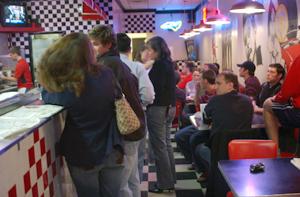After all of the applause had died down, and after members of Congress and guests of the federal government had taken their seats, President Bush began his annual State of the Union address with honoring the late wife of Martin Luther King, Jr.
“We are comforted by the hope of a glad reunion with the husband who was taken so long ago,” Bush said. “We are grateful for the good life of Coretta Scott King.”
Standing ovations, a historical trademark of the address, seasoned his hour-long speech that touched on the war, the economy, and the confirmation and swearing in of Associate Justice Samuel Alito that had taken place earlier that day.
“I will continue to nominate men and women who understand that judges must be servants of the law, and not legislate from the bench,” Bush said.
The president, in his address, said, “The state of our union is strong and together we will make it stronger.”
Members of N.C. State’s College Democrats and College Republicans watched the televised affair, but had mixed reviews.
“It’s one of the only times during the year that the president can address the citizens of the United States,” Adam Downing, chair of College Republicans and senior in electrical engineering, said. “The outline was great.”
Sudip Dutta, director of state affairs for College Democrats and senior in political science in French, however, said, “[Bush] did not deliver a speech that answered stronger plans toward achieving our national goals — whether it be aiding stability in Iraq, aiding education or solving our healthcare crisis.”
Regardless of political or ideological affiliation, it is widely recognized that Bush’s approval ratings have been less than optimal, with less than half of Americans saying he is doing a good job, according to a recent USA Today/Gallup polling report.
“Hopefully, this will get his policies back on track,” Brian Onorio, a computer science alumnus and former chair of College Republicans, said. “The year 2005 was the worst year of his presidency.”
Onorio went on to say that it truly felt as if the president “was talking to us.”
The bipartisan tension was more than obvious with several standing ovations being executed by one half of Congress at a time.
Republicans rushed to their feet and clapped their hands with excitement after President Bush asked for the renewal of the Patriot Act.
Democrats even led a seemingly sarcastic round of applause after it was mentioned that his proposal of Social Security reform had not been well received.
“It symbolized a united Democratic front against a Republican president who tried to destroy [social security],” Dutta said.
Onorio said he wished the president hadn’t focused so much on issues abroad, saying “it’s the State of the Union, not the State of the Middle East.”
“I wanted to hear more about economic policy and cutting the deficit,” Onorio said. “[Bush is] not as much of a fiscal conservative as someone I would like the president to be.”
In regards to the confirmation and swearing in of Associate Justice Samuel Alito, Downing said, “It’s glad to see Alito confirmed. We can carry on with the business of today.”
President Bush remained steadfast concerning his views of assisting nations in becoming democratic societies.
“Democracies replace resentment with hope,” he said.
Downing said students should be interested in watching the State of the Union address every year because it will help them “be better aware of what’s going on in society” and to be “better citizens.”
Dutta, however, said students should be asking for more.
“This country deserves a federal government that will strongly fund aid for higher education,” Dutta said.
The conclusion of the State of the Union address ended with a pleasant note, applauded by all who attended.
“We move forward — optimistic about our country, faithful to its cause, and confident of the victories to come,” Bush said. “May God bless America.”








